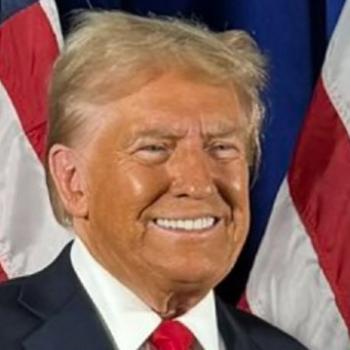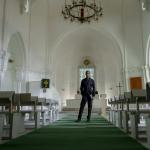If only to provide a new thread for the interminable discussion below, I thought it might be helpful to revisit a couple of biblical stories related to the theme of "private property."
The first passage is a classic text that has shaped the Christian understanding not only of the meaning of property, but of the role of the state. The second passage, which I'll save for a later post, is a little-remarked-upon oddity that, frankly, I find baffling.
1 Kings 21 tells the story of King Ahab and Naboth's vineyard. Ahab is sort of the archetypal Bad King in the Old Testament. His wife, Jezebel, is even worse. "There was never a man like Ahab," the writer of 1 Kings says, "who sold himself to do evil in the eyes of the Lord, urged on by Jezebel his wife." (You'll never, ever, meet anyone named after these two horrible people.)
A man named Naboth owned a vineyard near Ahab's palace, and the king proposed a trade. "Let me have your vineyard to use for a vegetable garden," Ahab said, "In exchange I will give you a better vineyard or, if you prefer, I will pay you whatever it is worth."
That seems like a reasonable offer, and not an unfair one. But Naboth isn't selling. "The Lord forbid that I should give you the inheritance of my fathers," Naboth says, sending Ahab home to pout and sulk.
As king of Samaria, Ahab apparently did not have the sweeping powers of eminent domain enjoyed today by potentates in, for example, Arlington, Texas. When Arlington coveted 13 acres for a new ballpark and the owners refused to sell, city officials swiftly acted on behalf of their cronies in the partnership that owned the Texas Rangers. The city condemned the properties, evicting the former owners and seizing all 13 acres for the city-subsidized ballpark (see also this handy timeline).
Jezebel decided upon a more direct course of action. "Command and do not beg," she told her husband. Then she hired a couple flunkies to testify that Naboth had cursed God and the king — crimes punishable by death. The sentence was quickly carried out. Naboth and his sons were stoned for his supposed blasphemy and his vineyard was seized for his supposed treachery. With Naboth out of the way, Ahab "got up and went down to take possession of Naboth's vineyard."
God sends the prophet Elijah to inform the king that God was not pleased by any of this: "I am going to bring disaster on you. I will consume your descendants and cut off from Ahab every last male in Israel. … Dogs will devour Jezebel by the wall of Jezreel. Dogs will eat those belonging to Ahab who die in the city, and the birds of the air will feed on those who die in the country."
Throughout history this story has informed the Christian understanding of the role of the state. As the Geneva commentary puts it, "This example of monstrous cruelty the Holy Spirit leaves to us, to the intent that we should abhor all tyranny."
Ahab and Jezebel were tyrants because they acted as though their power had no limit. This story suggests that Ahab, at least, knew better — he seemed to recognize that his power as king was limited by, among other things, Naboth's right to private property.
In the terms of our not-quite-achieved disagreement in the previous post, this supports some of what Scott has been saying: the right to private property is a vital check against the possibility of tyranny.
But it is not the only, nor the most important, such check. Nor is it the only, or the most important, human right. Like the power of the state, the right to private property is limited by the rule of law, by the competing claims of other rights, by custom, by morals and by a host of other factors implicit and explicit.
Naboth is not some Hayekian free-market enthusiast. He refuses to sell his vineyard because it is "the inheritance of my fathers." As such, it was his to sell, but only until the next year of Jubilee, when this tribal allotment would be restored to his family. The Jubilee law limited Naboth's right to "private" property as surely as it limited Ahab's royal power. To be a landowner or a king was really only a matter of stewardship. Neither the landowner nor the king is God. Naboth rejects the idea that his ownership of the vineyard is absolute, regarding that notion as a blasphemy worse than the false charge for which he is later condemned.
One problem with our neverending discussion (and part of the reason that it seems to be neverending) is that it presumes a binary situation in which private property rights can be limited only by the state and the state can be limited only by private property rights. That presumption leads to the idea that one or the other must, therefore, be regarded as absolute and unlimited. The question at the heart of this discussion seems to be, "Which is absolute? The power of the state? Or the right to private property?" The wrong questions will always produce the wrong answers.
One does not have to be a Hebrew prophet, or a believer in the God of Elijah, to answer "Neither."















